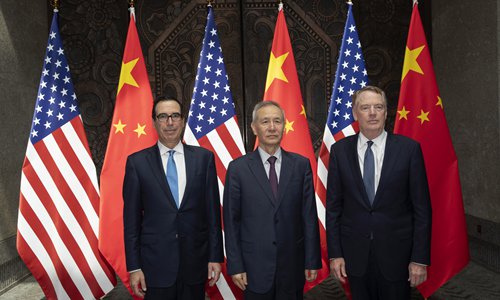HOME >> SOURCE
China, US could possibly sign phase one trade deal next week: sources
Source:Global Times Published: 2020/1/7 18:03:37

Chinese Vice Premier Liu He (center), US Trade Representative Robert Lighthizer (right) and US Treasury Secretary Steven Mnuchin pose for a photo before holding talks at the Xijiao Conference Center in Shanghai on Wednesday. Chinese and US negotiators met in Shanghai in a bid to bring an end to a year-long trade war. Photo: IC
China and the US remain on track to complete a phase one trade agreement, and a signing ceremony could take place next week, sources and analysts told the Global Times on Tuesday.
A Chinese delegation will likely travel to Washington next week to sign the agreement, experts said. However, specific dates for the delegation's departure and the signing ceremony are unclear.
As of press time, Chinese officials have not publicly announced details regarding the trip and the signature of the phase one agreement. US officials have been releasing differing information concerning the deal.
US President Donald Trump said in a tweet on December 31 that he will sign the phase one deal at the White House on January 15, and that high-level representatives from China will be present. Chinese officials have not publically confirmed the US president's announcement.
But Trump's timeline could be "reliable," said Gao Lingyun, an expert at the Chinese Academy of Social Sciences in Beijing who closely follows the trade negotiations. He said it's possible a Chinese delegation will travel to Washington early next week to sign the deal on January 15.
"Under normal procedure, China usually announces such trips three days in advance," Gao told the Global Times on Tuesday.
The South China Morning Post reported on Sunday that the Chinese delegation will depart for Washington on January 13 to sign the trade agreement. The newspaper had previously reported that the trip would take place on January 4.
"As for the deal's signature, I think both sides remain committed to signing the agreement as soon as possible. There is not much to contradict that," Huo Jianguo, vice chairman of the China Society for World Trade Organization Studies, told the Global Times on Tuesday.
However, Huo said there are still some areas where both sides need to work out more details. For example, both appear divided over the specific quantity of China's purchases of US products.
Han Jun, vice minister for agriculture and rural affairs, said last weekthat China will not adjust low-tariff quotas for corn, wheat and rice imports for any individual country, Chinese financial news outlet Caixin reported on Tuesday.
"They are global quotas. We won't adjust them for one individual country," Han was quoted by Caixin as saying.
Although the final text of the phase one deal has not been released, US officials have unilaterally announced that China will increase its purchases of US agricultural products as part of the agreement. US officials have even floated different numbers. China has not yet confirmed a specific number.
Huo said that Han's comments generally represent China's long-standing position that while it is committed to buying more agricultural products from the US, it cannot be an unreasonable specific amount.
"This might be an area where there is still dispute," he said. But he added that, if the US is reasonable, both sides have the wisdom to address any issues and complete the deal. "The phase one deal is great news for all parties."
RELATED ARTICLES:
Posted in: ECONOMY